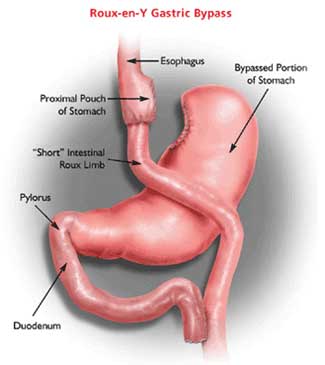Gastric Bypass Surgery has gained much notoriety in recent years as a fairly safe and efficient way to deal with weight issues which are difficult to manage. For many people the operation became a life-saving step, totally transforming their existence. However Gastric Bypass Surgery has its own setbacks, and it can and does affect the ability to absorb nutrients well from the foods ingested. It can also inhibit the effect of oral supplementation of vitamins. Gastric Bypass can affect B12 and other nutrient absorption on several levels.
1. The daily food intake is a bariatric patient is often greatly reduced, as the procedure prevents one from ingesting large portions.
2. The new stomach structure is made to bypass a portion of the digestive portion of the tract where most of the absorption of many vitamins and minerals occurs.
3. The gastric pouch is so reduced in size that it produces negligible amounts of the enzymes needed for the complete digestion and absorption of many foods.
4. The new digestive system prevents normal levels of production of gastric acid and intrinsic factor which are necessary for the proper absorption of vitamin B12
We will now discuss these points to clarify exactly how bariatric surgery hampers with the proper absorption of B12 vitamin and other nutrients. Firstly, as mentioned above, much of the absorption of vitamins and minerals from food occurs within the small intestine. Although only a small portion of the intestine is actually affected by the surgery (specifically in the hopes of avoiding problems with malabsorption), issues with intake of minerals and vitamins still arise. Many bariatric patients are told in post-treatment that it may be optimal for them to begin B12 injection therapy, and some doctors suggest that this 1000 mcg injection be administered daily, as the effect of surgery on the intrinsic factor could be damaging.
The surgery heavily affects the production of the intrinsic factor and gastric juices, which can end up causing a severe B12 deficiency in a matter of weeks (to read more about the importance of the intrinsic factor for B12 absorption click here). With the functions of intrinsic factor unable to properly bind to the vitamin and be reabsorbed in the small intestine, the individual is at high risk for developing the symptoms of the deficiency. It will also poorly influence the general wellbeing of the individual just recovering from surgery.

